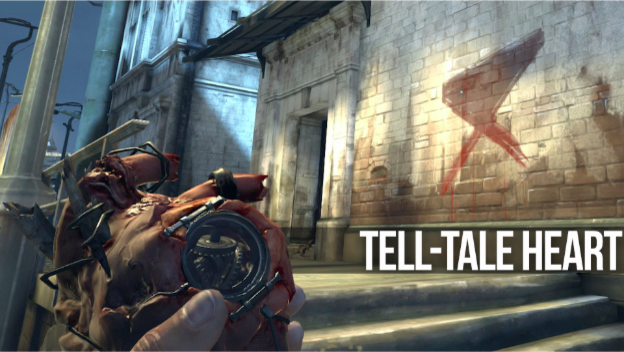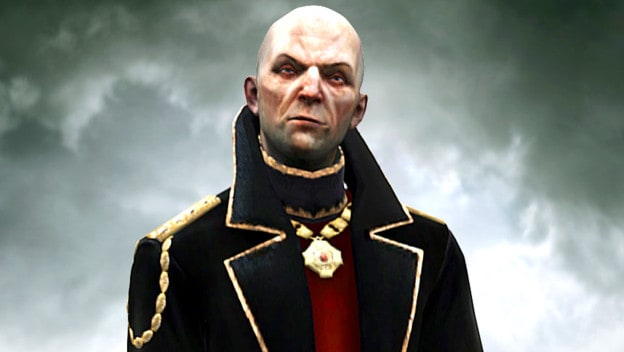Humanizing the enemy makes for a more dynamic and interesting game. This means that even if the protagonist is perfectly justified in their actions, we can still understand the justifications behind the people on the other side. This can invoke a moral decision on the player’s part on how to play the game, if the game allows such options. Not that every game should have humanized enemies – I want to just kill things now and then as much as the next gamer. However, I don’t think there can be any doubt that humanizing the enemy brings depth to a game.
Dishonored and the Assassin’s Creed series are very similar games, however I believe Dishonored achieves a depth that Assassin’s Creed never does. Within Assassin’s Creed , the main characters always have a justification for their murderous actions, whether it’s Ezio’s lust for vengeance for the death of his family or Edward Kenway’s avarice and will to survive. However, there is no humanization of the enemies in most of the Assassin’s Creed games nor any moral decisions as a result. There are consequences for the series making things so black and white.
There are two main consequences of dehumanizing the enemy in the Assassin’s Creed series: First, the player has a tendency to commit wartime atrocities, which are both morally repugnant and (in the real world) strategically injurious. For example, I’ve rushed headlong into a fortress in an Assassin’s Creed game and just killed everyone because there were no real in-game consequences for doing so more than I’d like to admit.
Second, dehumanization propagates a perspective of the enemy that is not only practically and morally harmful, but also inaccurate: wartime foes generally have a great deal in common and should at least recognize each other’s common humanity. Despite games that purport to offer multiple perspectives, like AC III and Black Flag , the Templars are painted as evil overlords with no regard for human rights. The stilted debate between Conner and Haytham does nothing to favor the Templars, instead it pushes Haytham into a villainous “bad father” role. Kenway is simply a pirate who wishes to survive, he applies no loyalty to one creed or the other. The series encourages the player to not care who they are killing or why. Such complacency is brought on by the lack of in-game consequences. There is no “bad” ending for slaughtering people indiscriminately and the player will succeed regardless of how reckless their actions were.
One of the key ways most of the Assassin’s Creed series manages to dehumanize the enemy is through the lack of dialogue from, as an example, the guards of a city or fortress. The dialogue for any of the guards might as well be non-existent. If they say anything at all, they speak directly about whatever it is they are guarding or doing, only speak when the player is discovered, or speak of specific information about a mission that the player needs to hear. None of these things are in any way humanizing. In fact, the guards might as well be automatons. This allows the game to be a one-way track towards one mission after another that is just about different obstacle courses to kill x amount of enemies, or one specific enemy. If this isn’t a lack of depth to you, I don’t know what is.

In immediate contrast, by humanizing the enemy, Dishonored allows the player to choose morally between killing and rendering the enemy unconscious. The player can commit however many “wartime atrocities” as they please, and paint all the guards with the same sin as the High Overseer’s. Nonetheless, there is no doubt that Corvo feels justified in his actions, as anyone would be after watching their lover murdered and to be subsequently framed for the crime. Yet, Dishonored still humanizes its enemies with well chosen dialogue between the guards themselves, and with the use of the Heart.
For example, one of the City Watch Officers classically says “should we gather for whiskey and cigars tonight?”. The very concept that the player’s enemies are capable of socializing outside of work implies that the Officers do not exist for the sole purpose of their guard duties. Furthermore, the Heart humanizes every character in the game to the point that any action on the player’s part is morally ambiguous. As such, of a City Watch Guard, the Heart says “When not at his post, he searches for his sister, missing a week now.” This humanizes the guard by implying a heartbreaking story – that his sister was likely lost to the plague and could not inform him in time. What better reason to continue your line of work but for the sake of insuring your family’s safety, regardless of the creed your superior adheres to? There are consequences for your actions in Dishonored, too, as the city and the end-game change drastically depending on how many people Corvo has killed.
Dishonored achieves a depth that Assassin’s Creed simply doesn’t. Dishonored uses tasteful dialogue and the Heart to humanize it’s enemies, whereas Assassin’s Creed purposely dehumanizes it’s enemies by turning them into automatons. The contrast of depth and moral intrigue in each game is clear, the simple act of humanizing the enemy in Dishonored creates such. Whereas in the Assassin’s Creed series, humanization is non-existent and therefore the game lacks depth.
